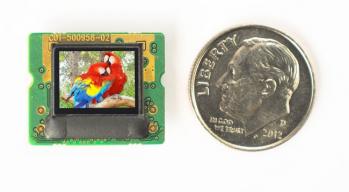Will OLEDs help revolutionize the pico projector market?
Market research company TechSci released a new report in which they forecast fast growth (41% CAGR) in the next five years for the global pico projector market. Currently most pico projectors used DLP and LCoS microdisplays, but in the future laser-based projectors will be common, and in addition OLED technology will also play a "significant role" in revolutionizing the pico projector market over the next five years.

This is really interesting. While OLEDs for pico projectors were discussed in the past, the only real activity we're aware towards such a solution was a EU projector called HYPOLED back in 2008. That project, led by the Fraunhofer Institute, developed a VGA full-color OLED microdisplay coupled with pico-projector optics. Originally MED supplied the microdisplays, but the company went bankcrupt and they continued the work with MicroOLED.
eMagin to double OLED microdisplay brightness in new R&D projects
 eMagin says that they will receive a number of R&D contracts over the next 2 months. The company will share more information when the contracts are officially signed, but they did say that they expect to more than double the brightness of their already ultra-high-brightness (5,000 cd/m2) full-color OLED microdisplays.
eMagin says that they will receive a number of R&D contracts over the next 2 months. The company will share more information when the contracts are officially signed, but they did say that they expect to more than double the brightness of their already ultra-high-brightness (5,000 cd/m2) full-color OLED microdisplays.
These new contracts will significantly increase eMagin's R&D contract revenue beginning in Q3 2014.
eMagin says that the bonding issues have been successfully resolved
In March 2014, eMagin received a notification to stop shipments to three customers pending review of a possible wire bonding problem in an OLED microdisplay. Two months later, eMagin updated that the issue was partially solved, and they resumed shipments to one customer.
 An eMagin OLED microdisplay
An eMagin OLED microdisplay
Now eMagin reports that they have resumed shipments (with no loss of expected volume) for two of those customers. They also expect to resume shipments to the third customer after their testing showed that the reliability requirements have been met.
eMagin demonstrates a direct-emission OLED microdisplay prototype
 eMagin demonstrate an ultra-high brightness full-color direct-patterned (DPD) OLED microdisplay. The so called OLED-ULT is 30 times brighter than the company's current largest-selling display, and it's 5 times more power efficient. eMagin says they are already shipping demonstrators to key customers - for applications such as aviation head mounted displays, smart glasses, and commercial augmented reality applications.
eMagin demonstrate an ultra-high brightness full-color direct-patterned (DPD) OLED microdisplay. The so called OLED-ULT is 30 times brighter than the company's current largest-selling display, and it's 5 times more power efficient. eMagin says they are already shipping demonstrators to key customers - for applications such as aviation head mounted displays, smart glasses, and commercial augmented reality applications.
It will probably take a while for the company to actually commercialize those displays. eMagin is developing DPD panels since 2012 at least - it's not an easy process. Currently all OLED microdisplays on the market use color-filters on top of white OLED subpixels, and a direct-patterned microdisplay is much more efficient. The Fraunhofer COMEDD is also developing DPD OLEDs.
eMagin reports Q1 2014 financial results
eMagin reported their financial results for Q1 2014. Revenues for the OLED microdisplay maker in the quarter were $6.3 million (down from $8.5 million in Q1 2013, but up from $6.1 million Q4 2013). The company shipped fewer units and also saw a decrease in the average selling price. Net loss in the quarter was $1.6 million (down from a net income of $205,000 in Q1 2013). eMagin has $8.3 million in cash, down from $11 million in the end of 2013.
 eMagin XGA096 OLED-XL
eMagin XGA096 OLED-XL
eMagin says the the lower revenues were mostly because of the stop order from three customers regarding the wire bond issue. This issue was partially solved. Shipments to one of the customers already resumed last month, and the company expects to resume shipment to the second customer in late June and to the third customer in late July.
eMagin and GOT settle their OLED licensing dispute

 In January 2014, Global OLED Technology (GOT) filed a complaint in the Supreme Court of the State of New York against eMagin for breach of license agreement.
In January 2014, Global OLED Technology (GOT) filed a complaint in the Supreme Court of the State of New York against eMagin for breach of license agreement.
Today eMagin announced that it entered into a settlement agreement with Global OLED Technology. The two companies terminated the original patent license agreement in exchange for mutual releases and the payment by eMagin of a one-time, undisclosed settlement amount. GOT will dismiss its lawsuit and eMagin will not pay any royalties to GOT (their current product offering does not incorporate any GOT IP.
eMagin reports 4Q 2013 financial results
eMagin reported their Q4 2013 financial results. Revenues in the quarter were $6.1 million (as already announced) - down from $8.3 million in Q4 2012. Adjusted EBITDA was a loss of $2.1 million (compared to an earnings of $1.6 million last year).
 An eMagin OLED microdisplay
An eMagin OLED microdisplay
For the whole 2013, eMagin reached $28 million in revenues (down from $30.6 in 2012). Product sales actually increased a little bit from 2013, but contract revenue dropped 62%. Operating loss in 2013 was $5.2 million. As of December 31, 2013, eMagin had about $11 million in cash and equivalents (down from $13.4 million in December 2012).
eMagin's customers complain of possible wire bonding issue in their OLED microdisplays
eMagin said they received a notification to stop shipments to three customers pending review of a possible wire bonding problem in a microdisplay. These customers (who supply systems to government programs that include eMagin OLED displays) have indicated that they will not accept eMagin displays until the issue has been resolved.

eMagin believes that upon completion of its review and with concurrence of the applicable customers, anticipated shipments of the Company’s products to such customers will resume shortly.
eMagin reports disappointing Q4 2013 preliminary revenue
eMagin announced that preliminary revenue for Q4 2013 was about $6.1 million. That's about $2 million less than expected. This ends a very challenging year for the OLED microdisplay maker. Looking forward, the company wants to strengthen their manufacturing processes and reach "acceptable" yield levels, and expects to return to revenue growth in 2014.

eMagin says that demand for their microdisplays remains strong, but there was a "shortfall in anticipated product revenue" for the quarter, resulting from equipment downtime, low yield and lower average sales prices. Contract revenue in the period is still low due to fewer government R&D contracts as a result of the U.S. government sequestration.
Global OLED Technology sues eMagin for breach of license agreement

 Global OLED Technology (GOT) filed a complaint in the Supreme Court of the State of New York against eMagin for breach of license agreement. eMagin has been a licensee of GOT's patent portfolio (which originated at Kodak) since 1999.
Global OLED Technology (GOT) filed a complaint in the Supreme Court of the State of New York against eMagin for breach of license agreement. eMagin has been a licensee of GOT's patent portfolio (which originated at Kodak) since 1999.
GOT says that eMagin breached its patent license agreement by failing to pay annual minimum royalty payments, neglecting to report or pay royalties for the sales of licensed products, and breaching certain confidentiality obligations.
Pagination
- Previous page
- Page 10
- Next page



